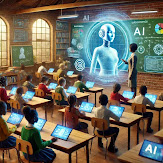Virtual Tutors and Personalized Learning in Africa
Artificial Intelligence (AI) is transforming industries globally, and education in Africa is no different. As the continent has a burgeoning youth population coupled with rising internet penetration, AI-powered education solutions are assisting in plugging learning gaps, making education accessible, personalized, and efficient.
The Need for AI in African Education
Africa also possesses several education-related challenges that have to be fixed, including overpopulated classrooms, inadequate experience among teachers, and insufficient availability of educational facilities. In the majority of the rural regions, there is poor school infrastructure that makes it difficult for students to gain quality education. AI can offer a potent solution by personalizing learning, automating management tasks, and making remote learning possible.
How AI is Changing Education in Africa
1. Tailored Learning Experiences
AI systems personalize the learning pace and requirements for each student. Rather than the one-size-fits-all approach, AI learns knowledge gaps and delivers personalized learning content. For example, technology such as Eneza Education in Kenya provides AI-powered lessons through mobile phones so that students in rural areas can access quality education.
2. AI-Powered Virtual Tutors
AI-powered virtual tutors offer real-time support to students. AI-powered chatbots and apps can respond to questions, offer explanations, and even grade students' progress. For instance, Kenya's M-Shule leverages AI to offer one-on-one tutoring through SMS, enabling even those students who do not have smartphones to learn.
3. Bridging the Teacher Gap
Most of the African nations face a lack of qualified teachers. AI can assist by automating lesson plans, grading student assignments, and even creating interactive content. Sawa School in Uganda is one such tool that applies AI to improve remote learning experiences and allow students to access quality digital education.
4. Increasing Access to Education
AI makes it possible for students in war zones or remote locations to learn via mobile applications, websites, and virtual classrooms. AI-powered translation tools also break language barriers, allowing students to learn in their local languages while acquiring skills in international languages such as English and French.
5. Career Guidance and Skill Development
AI is not only confined to conventional subjects but also assists in acquiring practical skills for the contemporary job market. AI-driven career guidance software examines students' interests, aptitudes, and academic records to recommend appropriate career options. EdTech companies such as uLesson in Nigeria offer interactive learning content based on the needs of the students.
Challenges and Future Prospects Though promising, there are setbacks for AI adoption in African education, including poor internet connectivity, prohibitively expensive digital tools, and a shortage of AI-trained teachers.
Yet, with rising tech investments and governmental backing, AI can revolutionize education throughout the continent. The future of AI in education in Africa is bright, with innovations still to come. As technology becomes more accessible and less costly, AI will have an even larger part to play in enabling education to be inclusive, effective, and fun for millions of learners. Conclusion AI is transforming education in Africa through personalized learning, virtual tutors, and new teaching methodologies. Though there are still challenges, the adoption of AI-powered solutions can close the education gap to make quality education accessible to every child irrespective of their geographical location. Adopting AI in education is not a choice but a compulsion for the future growth of Africa.


very interesting write up
ReplyDelete